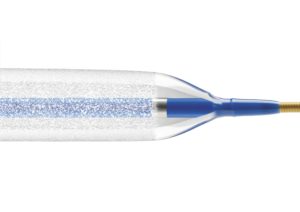
Philips has received US Food and Drug Administration (FDA) approval for two Stellarex 0.035” low-dose (200mm and 150mm) drug-coated balloons for the treatment of de novo and restenotic lesions in native superficial femoral or popliteal arteries.
According to a press release, the new balloons broaden physicians’ treatment options for peripheral artery disease (PAD) patients with a high risk of restenosis and expand the Stellarex portfolio, which has a proven significant treatment effect and high safety profile. The 200mm and 150mm Stellarex 0.035” low-dose DCBs are now available in the USA and will be rolled out to other markets in due course.
“With its unique coating, Stellarex is unlike any other DCB in the industry for the treatment of PAD,” said Chris Landon, general manager, Image Guided Therapy Devices at Philips. “Stellarex is the only low-dose drug-coated balloon with a proven treatment effect at three years compared to the existing standard of care in the USA and Europe. By expanding our range of Stellarex balloons, we are adding to the treatment options that physicians can use to provide optimal care for each patient with peripheral arterial disease.”
All Philips’ Stellarex DCBs feature EnduraCoat technology, a coating consisting of a polyethylene glycol excipient with amorphous and crystalline paclitaxel particles dispersed in it. The coating provides drug transfer and effective drug residency coupled with high coating durability and minimal particulate loss, thereby enabling a low therapeutic drug dose. The Stellarex balloon is now available in 40, 60, 80, 100, 120, 150, and 200mm lengths for the treatment of lesions in the superficial femoral and popliteal arteries with vessel diameters of 4–6mm.
The results of third-party analyses of patient-level data from worldwide clinical trials of the Philips Stellarex 0.035″ low-dose DCB in lengths under 150mm were recently published in Circulation. Primary safety analysis of Philips Stellarex DCB three-year data, comprising a large published, pooled set of randomised controlled trial (RCT) data for a single paclitaxel-based device, showed no difference in mortality between patients treated with the Philips Stellarex DCB and those treated with percutaneous angioplasty, the current standard of care. The analyses represent one of industry’s most extensive and rigorous safety assessments of a paclitaxel-based device.









